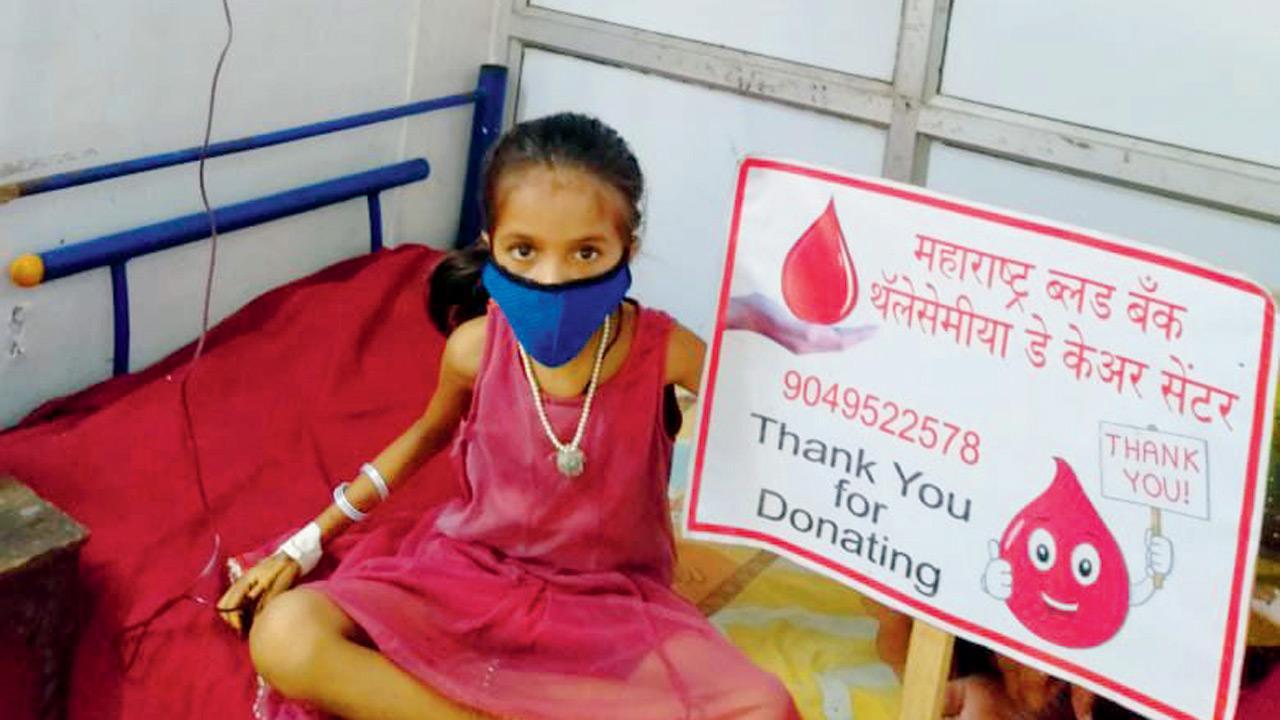Covid-19 pandemic, vaccination have led to a sharp drop in donation in Palghar; families running from pillar to post to ensure loved ones get blood every 15 days

A child undergoing blood transfusion at a centre in Palghar district on Tuesday. Pics/Hanif Patel
Families of thalassemia patients in Palghar district are running from pillar to post to ensure their loved ones get treatment on time. Most people with the disorder need transfusion twice a month, and with stocks at blood banks on the verge of drying up, their kin are scared.
ADVERTISEMENT
Some relatives told mid-day that blood banks are demanding replacement donors. Those vaccinated can’t donate for 14 days after taking the shot.
As most families are from underprivileged backgrounds, they cannot travel to Mumbai to get blood. Local trains are shut for the general public and road journeys are too costly for labourers or daily wage earners, said Vaishali Chawhan who runs the Maharashtra Blood Bank (MBB) near Palghar station.
Dr Arun Thorat, member, State Blood Transfusion Council
Not many donors
Akhand Pratap Mishra, who works at a private firm in Boisar, has an eight-year-old daughter, Siddhi, who suffers from thalassemia. “She needs O+ blood every 15/20 days. We never faced this issue in the past few years, but the blood banks are running dry because nobody is coming out to donate.” To get blood for her this month, I had to request a donor to come with me to the blood bank.”
A daily wage earner, Manoj Gharat’s five-and-a-half-year-old son Bhavarth needs O-ve blood every 15 days. “Before the lockdown, I would take my son to KEM hospital for transfusion, but I can’t travel to Mumbai now as we aren’t allowed on trains yet. We managed here for some time, but now we’re facing a severe shortage.” He added, “I have to literally fold my hands before people to donate blood.”
Taxi driver Riyaz Shaikh had lost his daughter to thalassemia in 2015. Now, he is scared for his 22-year-old son Rahil, who also has the blood disorder. “He needs A+ blood twice a month, but there is a severe shortage in Palghar. I don’t want to lose my son because of blood shortage.”
Vaishali Chawhan, owner, Maharashtra Blood Bank in Palghar
Two donation camps in July
Dr Rajendra Kelkar, the additional civil surgeon of Palghar district, said two blood donation camps will be organised next month. “We have 93 thalassemia patients (excluding the VVCMC area) in the district and they regularly need blood transfusion, which is done at Jawhar and Dahanu Sub District hospitals. Due to the shortage, we have planned donation camps at Jawhar on July 2 and at Dahanu on July 4. We are expecting a decent footfall.”
Dr Surekha Walke, the medical health officer of Vasai-Virar City Municipal Corporation, said there are seven thalassemia patients in her jurisdiction.
Dr Rajendra Chawhan, a member of Palghar Covid-19 Task Force, told mid-day, “There is a severe blood crisis here.” He runs a day-care centre for blood transfusion of thalassemia patients at his hospital near Palghar station, besides the MBB owned by his wife Vaishali.
“We had been arranging blood so far, but we are also almost out of it,” said Vaishali, adding that the district needs more day care centres for thalassemia patients.
Highlighting another problem, she said most patients belong to underprivileged families, so their kin can’t afford to travel to Jawhar from Palghar taluka. “Most of them lost their jobs in the lockdown. They have no source of income and no contacts to arrange replacement donors. They are in a crisis.”
Vaishali’s blood bank is also getting inquiries from Vasai-Virar and Nalasopara areas. “A few patients have also been referred to us from top hospitals in Mumbai.”
Dr Arun Thorat, the assistant director of State Blood Transfusion Council, told mid-day that the state has about 21,000 blood bags, “but every day there is a requirement of around 4,000 of them across the state.” Around 30 per cent of blood from the banks is used in emergency cases, he added.
“There is an urgent need for small blood donation camps to tackle the storage. We don’t need large camps, as the shelf life of a blood bag is only 35 days,” Dr Thorat said.
“The shortage of blood is the cascading effect of the pandemic and the vaccination drive. While people cannot step out because of the Covid-19 threat, those vaccinated can’t donate blood for 14 days after taking the shot.”
 Subscribe today by clicking the link and stay updated with the latest news!" Click here!
Subscribe today by clicking the link and stay updated with the latest news!" Click here!





_d.jpg)

